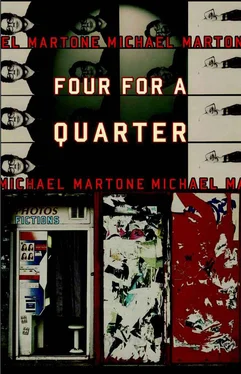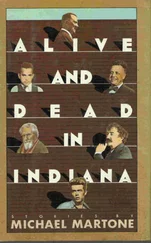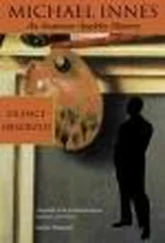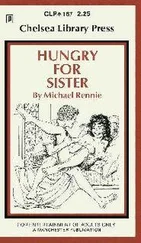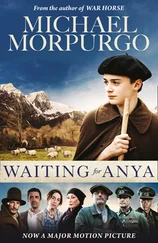Michael Martone - Four for a Quarter - Fictions
Здесь есть возможность читать онлайн «Michael Martone - Four for a Quarter - Fictions» весь текст электронной книги совершенно бесплатно (целиком полную версию без сокращений). В некоторых случаях можно слушать аудио, скачать через торрент в формате fb2 и присутствует краткое содержание. Год выпуска: 2011, Издательство: Fiction Collective 2, Жанр: Современная проза, на английском языке. Описание произведения, (предисловие) а так же отзывы посетителей доступны на портале библиотеки ЛибКат.
- Название:Four for a Quarter: Fictions
- Автор:
- Издательство:Fiction Collective 2
- Жанр:
- Год:2011
- ISBN:нет данных
- Рейтинг книги:3 / 5. Голосов: 1
-
Избранное:Добавить в избранное
- Отзывы:
-
Ваша оценка:
- 60
- 1
- 2
- 3
- 4
- 5
Four for a Quarter: Fictions: краткое содержание, описание и аннотация
Предлагаем к чтению аннотацию, описание, краткое содержание или предисловие (зависит от того, что написал сам автор книги «Four for a Quarter: Fictions»). Если вы не нашли необходимую информацию о книге — напишите в комментариях, мы постараемся отыскать её.
. In subject — four fifth Beatles, four tie knots, four retellings of the first Xerox, even the sex lives of the Fantastic Four — and in structure — the book is separated into four sections, with each section further divided into four chapterettes—
returns again and again to its originating number, making chaos comprehensible and mystery out of the most ordinary.
Four for a Quarter: Fictions — читать онлайн бесплатно полную книгу (весь текст) целиком
Ниже представлен текст книги, разбитый по страницам. Система сохранения места последней прочитанной страницы, позволяет с удобством читать онлайн бесплатно книгу «Four for a Quarter: Fictions», без необходимости каждый раз заново искать на чём Вы остановились. Поставьте закладку, и сможете в любой момент перейти на страницу, на которой закончили чтение.
Интервал:
Закладка:
JULY 4 TH, 1980, AMES, IOWA
That summer I moved to town a month early before the job started and rented an apartment on the ground floor of an old brick house near the power plant downtown. At night, I walked to Main Street through Band Shell Park that did have an old band shell used, I found out, for concerts once a week by the city's band, wearing uniforms left over from the high school production of Music Man , playing Sousa marches and Sound of Music songs at dirge tempo. In the branches of the oaks beyond the band shell, a cow, a Jersey, perched, or so it seemed, content and grazing. Boyd's Dairy's life-sized sign swayed above the ice cream stand, suspended by invisible wires from old flagpoles. Boyd's served four flavors — chocolate, vanilla, strawberry, and a daily special that was usually bubblegum. I got a scoop of chocolate in a cup, walked down Main Street to the deserted train station, and sat on the platform under the eaves, my back against the wide clapboards, and looked out over the double-track right-of-way. I waited for the next train going through, east or west, forty or fifty a day, grain trains mainly, made up of closed hopper cars or gondolas painted in ice cream pastel colors hauled by the green and yellow engines of the Chicago and Northwestern, the Cheap and Nothing Wasted, blowing the horns through every crossing all through town and punctuated on the end with a caboose in a blindingly bright shade of safety yellow whose brakeman or conductor in the bay window usually took the time to wave at me as I waved back with my pink plastic spoon. When I first moved to town, I walked through the park and past Boyd's Dairy and up Main Street to the Hotel Muhm to have my hair cut by the barber whose shop was in the lobby. That summer I was reading westerns, starting with The Last of the Mohicans, Shane , and Little Big Man . I had The Virginian when I went inside, and began to read it after I sat down to wait my turn. Then the barber finished with the customer, and the customer paid while the barber dusted the seat of the chair with a towel. I dog-eared the page in my book and sat down in the empty seat, waiting for the barber to drape the sheet around my neck. “I don't cut long hair,“ he said. “OK,“ I said to the barber standing behind me. “I said,“ he said, “I don't cut long hair.“ My hair was long, I thought, that was why I came in for a haircut, but not that long. Before I could say anything more, the barber said, “I don't cut your hair.“ And I got up and left. When I opened the door to the flat, I saw the door I found in Baltimore leaning against the far wall of the big empty living room that had been converted into my bedroom by the convertible couch converted into an unmade bed. I still had to finish the unfinished white pine wood bookcases, staining them later to look like dark oak. Soon after that, my tooth began to ache, one in back on the left, the lower jaw, from the cold daily ice cream, and I had to find a dentist. I didn't have a car then, so I walked into the first office I could walk to. The dentist was able to have a look right then, no waiting, and I sat in the chair with my finger still in my place in The Virginian . My wisdom teeth were impacted, all of them, and the dentist recommended they come out as soon as possible and recommended the long holiday weekend. I had been told that there was a neighborhood parade on my block — bicycles and red wagons tricked out with crepe paper and streamers, kazoo bands, batons, hula hoops, and everyone with little flags. Recovering after the procedure, I could take my lawn chair and sit by the curb, see the kids ignite snakes on the sidewalk and light sparklers in the daylight, watch the riding lawn mowers trailing bunting and the dogs and cats dressed up like minutemen. I never made it to the parade, only imagined it in my stupor brought on by the pain pills I was given, the leftover effects of the amnesia drugs that kept me awake for the removal of teeth numbered 1, 16, 17, 32 but left me remembering nothing, nothing of it until I woke up on the train platform, my ear to the ground, the steel wheels stuttering over a rail joint, waiting for this train, convinced that a wave from the brakeman or the conductor was all I needed to get better, the cool mint colors of the cars already gone, forgotten, a balm.
JULY 4 TH, 1983, BRANFORD, CONNECTICUT
That summer I rented a house in Branford, a shoreline village outside New Haven. The house, an old foursquare with a big screened-in porch, was built above a pebble beach overlooking a very calm Long Island Sound. Long Island itself was in the distance, a thickening of the pencil-line horizon off to the south. I read, in a hammock strung up on the porch, all of Patrick O'Brian's books set on sailing ships during the Napoleonic Wars, which always mention the hammocks strung up between the beams of the lower decks of the frigates, the men-of-war, the ships-of-the-lines. I would look up from the book to see the Sound off in the distance — through the screen, the branches of trees, and over the roofs — suddenly filled with sails of all types reaching across the cove and then turning and tacking back down east. Speedboats darted across the wakes, the only wave in the water, going up on step and slapping back down to make a sound that would reach me many seconds after it happened. When I wasn't reading, I walked through the neighborhoods, the houses mostly year-round places whose inhabitants lived all the time at the beach so that the novelty of the ocean had worn off. They vacationed elsewhere. On the cross-country drive to get there, I went through Amish settlements in Indiana, Ohio, Pennsylvania, and stopped once in one of the stores and bought a big, black, broad-brimmed flat straw hat I wore as I walked through Branford and down to the beach with my folding chair and flag-striped towel to watch the boats wheel, the fang-shaped sails stirring in the smooth water with the bright sunlight amplifying what little chop there was, a sprinkle of sparkle. I rolled up my long pants to the knees and waded out into the shallow water. The breeze that pushed the boats blew further out. The shade from my hat cast a black shadow like a hole into which I could step, fall completely through. I had driven out to Branford in a '67 Dodge Dart I inherited from an aunt. The temperature gauge had never worked until it did one night, instantly jumping from C to H as I drove through fields in Iowa, fireflies sparking off the corn all around me. The radiator blew, blowing fluid through the hood onto the windshield. Ever after, mechanics, who loved working on the ancient engine, the old slant-six, clucked when they saw the blood-red that rust had painted the engine and its compartment. From Branford, I drove the Dart into New Haven, stood in line for a seat in one of the pizza places there, something the guidebooks said I should do. By the end of the summer, I ended up liking Sally's more than Pepe's, not so much for the pizza as for the many pictures of Sinatra on the wall there. I waited by myself in the lines outside and often sat with strangers inside, taking up the odd seat, and only mentioned I was spending the summer in Branford if anyone asked. I read about old sea battles and walked to the beach and through the town and then back up to try to write something myself — a story or a poem — as I rocked slowly back and forth in the hammock on the porch. Or, as a change of pace, I hiked up the road toward the interstate, to the Trolley Museum and rode an old street car — the PCC salvaged from Philadelphia, the bright red open-sided convertible car from Brooklyn, or the drab trolley from the St. Charles line in New Orleans with the destination placard scrolled to Desire. The cars trundled through the salt marshes and scrub forest, sparks spilling from the overhead wire on the turns. At Short Beach, where the track ended, the motorman got out to lower the trailing trolley and then forked up the leading trolley to contact the wire. He got back inside, flipped the backs of the seats over rattan benches to face the front, and powered up the car to go back in the other direction. I turned the lights out in the house the night of the Fourth. The neighborhood around me was dark, the houses emptied out. The local families going into New Haven to celebrate, a vacation from the permanent vacation the village seemed to live. There was no moon but plenty of stars drifting south and west. Far away on the north shore of Long Island the fireworks there began, launched to bloom silently just above a seam in the dark. The explosions were so small that I couldn't tell the patterns or be sure of the color, only the intensity of light. The porch screen blurred the little smudges further, framed them in the pricked openings of the wire mesh. It is all perspective, the miniature bombardment that breathed out and then smeared, falling back into the sea. Up and down the length of the island, the static scatter of sparks, as if they were signaling each other, a couple dozen patches flaring up, tendrils of one or two high altitude rockets arching back over the lit-up pulse of smoke. Fleck of rust. Burning mold. A random pantomime that seemed to communicate, in some subdued but desperate code, that something urgent was happening somewhere else.
Читать дальшеИнтервал:
Закладка:
Похожие книги на «Four for a Quarter: Fictions»
Представляем Вашему вниманию похожие книги на «Four for a Quarter: Fictions» списком для выбора. Мы отобрали схожую по названию и смыслу литературу в надежде предоставить читателям больше вариантов отыскать новые, интересные, ещё непрочитанные произведения.
Обсуждение, отзывы о книге «Four for a Quarter: Fictions» и просто собственные мнения читателей. Оставьте ваши комментарии, напишите, что Вы думаете о произведении, его смысле или главных героях. Укажите что конкретно понравилось, а что нет, и почему Вы так считаете.
